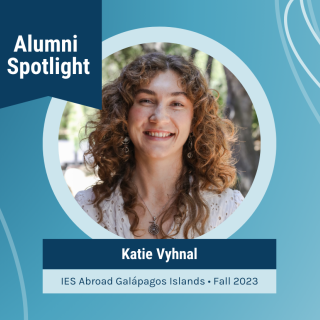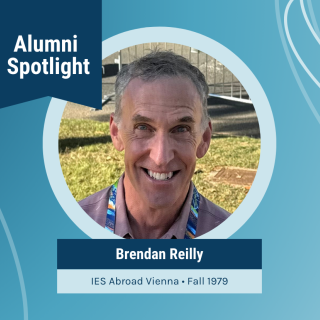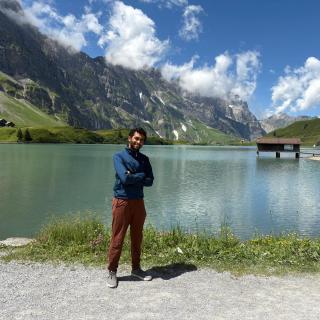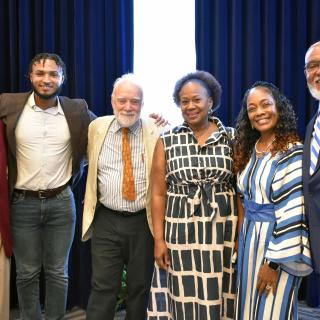Studying abroad is always a memorable, life-changing experience. But some people are so taken by a place (and the people they meet there) that, when they return home, they immediately make more permanent plans to return. Our Alum of the Month, Christine (Zins) Scheier (IES Abroad Berlin Fall 2000), is one of these people. Since 2002, she has been living and working in Germany at a global company where, as a Marketing Manager, she uses her language skills in both English and German. Christine shares her journey back to Germany with us.
IES Abroad: Why did you choose to study abroad in Berlin?
Christine Scheier: Seems like a straightforward question, but the decision probably started in high school when I selected which language to learn. I only had two choices—Spanish or German. German seemed more attractive to me at the time for several reasons. I have a German heritage. And German was taught at a neighboring high school, so I’d be able to widen my circle of friends. I found Spanish more difficult because I wasn’t very good at rolling my R’s!
Since I had planned to minor in international business…study abroad had always been part of my plan. Once I selected IES Abroad as the organization I wanted to study abroad with, I looked at the potential locations. The options available at the time were to either study in a smaller town in southwest Germany with courses in English or to study in Berlin with courses in German. I found the idea of living in a big city like Berlin very attractive, and I thought it would be better for my language skills. Funny enough, I now live in smaller town in southwest Germany! [Boeblingen, near Stuttgart]
IES Abroad: What did you learn about yourself or people in general during your study abroad experience in Berlin?
CS: Studying abroad was a real eye-opening experience for me. I had never considered how many aspects of daily life are influenced by the country and culture I grew up in. I think a lot of times that patriotism can lead to people thinking that their way of doing or thinking about things is better than how people in another culture view or do things. So it was weird to see that the Germans do and view things differently, but that it still works. In the cases where I thought it worked even better than what I previously was familiar with, I sometimes adopted local practices.
IES Abroad: Tell me about your housing experience in Berlin?
CS: I lived in a nice old apartment in Treptow (in southeast Berlin) with a woman only slightly younger than my parents, as well as her teenage daughter. I’m still in contact with her today! She spoke very little English and was therefore a great help to me in learning German. I remember needing a dictionary in order to ask her if I could help her wash the dishes and to carry on conversation with her while doing so. She looked in on me when I was ill and was mourning the loss of my grandfather.
IES Abroad: How did studying abroad in Berlin influence you?
CS: My original intention was just to study in Berlin for six months and return to the U.S. to finish my studies and find a job. While in Berlin, however, I fell in love with the country, the culture, and one young German man in particular! After returning home from my study abroad, the only thing I really wanted to do when I graduated was to live and work in Germany. Now I am married to that man [Thomas] and have a beautiful daughter [Olivia] with him.
IES Abroad: What do you love about living abroad in Germany?
CS: I’ve been living in Boeblingen since August of 2002. Living here is a bit like the slogan for Ritter sport chocolate: qudratisch, praktisch, gut (square, practical, good)! There are certainly more beautiful cities to live in, but Boeblingen has a lot of advantages. It has a strong economy with several well-known multinationals where my skillset and cultural background are in demand. Honeywell (where I work), IBM, and HP are just a few examples. Boeblingen is big enough to be interesting, with concerts, cafes, museums, and festivals, but small enough to be safe. It’s got great public transportation connections to Stuttgart and the airport. The Black Forest, France, Switzerland, and Lake Constance are all within a 1.5-2 hour drive. As in a lot of German cities, it is possible to walk to a lot of shops or service providers that you need for daily life. I can walk to four different grocery stores, a bakery, a gas station, and the local brewery within 5-20 minutes. In the local woods, there are at least 22 km of trails to run. This was important to me back when I used to run marathons.
IES Abroad: Tell us about your career at Honeywell.
CS: Sure. I started at Honeywell in Golden Valley, MN, as a marketing intern shortly after I returned from my study abroad in Berlin. I worked full time in the summer and part time while continuing my education…About a half a year before I was going to graduate, my boss asked me what my plans were after graduation. I told her that I really wanted to go back to Germany, and that I was already looking for ways to make that happen. She told me about a recent job opening that she had heard about in Germany and recommended that I apply. After several interviews and some problems obtaining a working visa for Germany, things finally fell into place. I moved to Germany with the maximum allowance of luggage I could take on an international flight—two checked suitcases and two carry-ons (a guitar and a backpack).
IES Abroad: What’s a typical day like?
CS: Nothing has really been typical since my daughter was born! Right now I am working 30 hours per week—part time during parental time. (Parental time can last up to three years per child.) Right now, the biggest thing I am working on is a product launch for a BACnet-based building management system.
I have a very global job in a very global company. In a typical week, I interact with coworkers, customers, and bosses from Germany, Sweden, India, Turkey, South Africa, Brazil, Morocco, the U.S., Australia, and England just to name a few. In order to face time zone challenges, I average one or two evening teleconferences a week, which I conduct from home.
IES Abroad: Do you have any advice for students thinking about studying abroad?
CS: Do it! Ideally choose a country with a different language than your native one so that you can improve your fluency. Even though English is spoken in many countries, you will be able to connect with the people and culture better if you can speak the language at least to some extent. This is valid not only for study abroad, but also for your career. Once you’ve made the decision, start preparing. Nowadays there are so many resources available online, so there is no excuse not to work on your language skills before you go. Even if you don’t understand much initially, continue listening to the language. For German, I would go to www.heute.de and start with the news.
If you choose to study in Berlin, I highly encourage you to participate in the Berlin Marathon either as a runner or a spectator. If you want to run in it, you need to sign up a year in advance.




